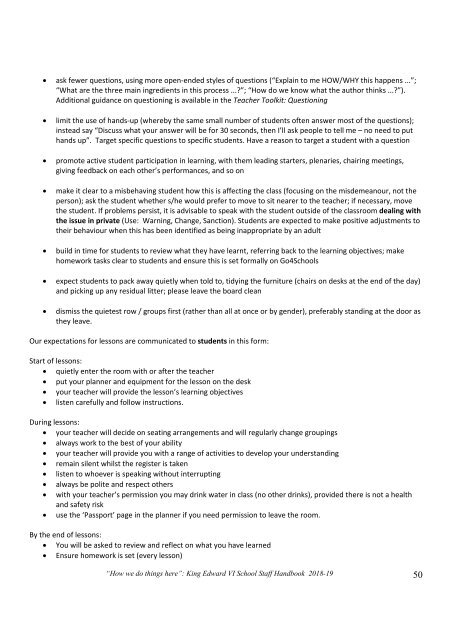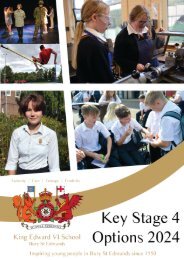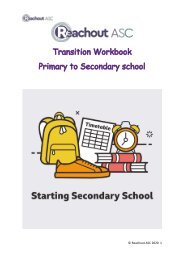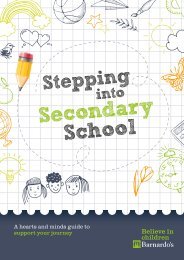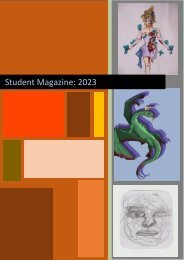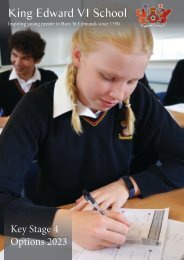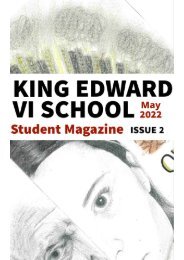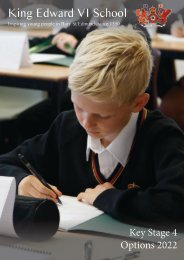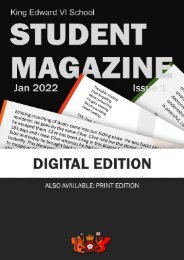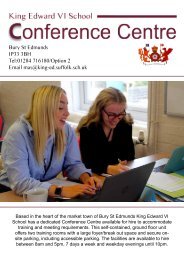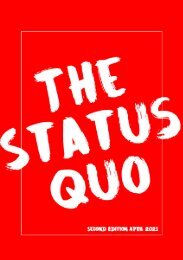Staff Handbook 2018 - 2019 FINAL
Create successful ePaper yourself
Turn your PDF publications into a flip-book with our unique Google optimized e-Paper software.
ask fewer questions, using more open‐ended styles of questions (“Explain to me HOW/WHY this happens ...”;<br />
“What are the three main ingredients in this process ...?”; “How do we know what the author thinks ...?”).<br />
Additional guidance on questioning is available in the Teacher Toolkit: Questioning<br />
<br />
<br />
<br />
<br />
<br />
<br />
limit the use of hands‐up (whereby the same small number of students often answer most of the questions);<br />
instead say “Discuss what your answer will be for 30 seconds, then I’ll ask people to tell me – no need to put<br />
hands up”. Target specific questions to specific students. Have a reason to target a student with a question<br />
promote active student participation in learning, with them leading starters, plenaries, chairing meetings,<br />
giving feedback on each other’s performances, and so on<br />
make it clear to a misbehaving student how this is affecting the class (focusing on the misdemeanour, not the<br />
person); ask the student whether s/he would prefer to move to sit nearer to the teacher; if necessary, move<br />
the student. If problems persist, it is advisable to speak with the student outside of the classroom dealing with<br />
the issue in private (Use: Warning, Change, Sanction). Students are expected to make positive adjustments to<br />
their behaviour when this has been identified as being inappropriate by an adult<br />
build in time for students to review what they have learnt, referring back to the learning objectives; make<br />
homework tasks clear to students and ensure this is set formally on Go4Schools<br />
expect students to pack away quietly when told to, tidying the furniture (chairs on desks at the end of the day)<br />
and picking up any residual litter; please leave the board clean<br />
dismiss the quietest row / groups first (rather than all at once or by gender), preferably standing at the door as<br />
they leave.<br />
Our expectations for lessons are communicated to students in this form:<br />
Start of lessons:<br />
quietly enter the room with or after the teacher<br />
put your planner and equipment for the lesson on the desk<br />
your teacher will provide the lesson’s learning objectives<br />
listen carefully and follow instructions.<br />
During lessons:<br />
your teacher will decide on seating arrangements and will regularly change groupings<br />
always work to the best of your ability<br />
your teacher will provide you with a range of activities to develop your understanding<br />
remain silent whilst the register is taken<br />
listen to whoever is speaking without interrupting<br />
always be polite and respect others<br />
with your teacher’s permission you may drink water in class (no other drinks), provided there is not a health<br />
and safety risk<br />
use the ‘Passport’ page in the planner if you need permission to leave the room.<br />
By the end of lessons:<br />
You will be asked to review and reflect on what you have learned<br />
Ensure homework is set (every lesson)<br />
“How we do things here”: King Edward VI School <strong>Staff</strong> <strong>Handbook</strong> <strong>2018</strong>-19 50


